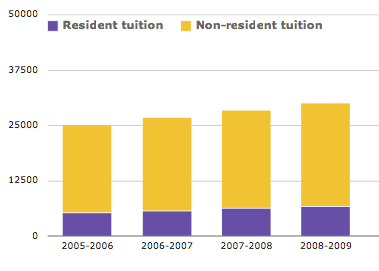Tameika Ramseur
Research in the Disciplines 201-College !
Professor Goeller
8 October 2013
Working Title: The Scam of Out of State Tuition
Topic
Out of state tuition has come to an all time high in the past few years. The government has given less funding to state universities and their way to continue funding is the process of privatization. Universities have become very dependent on the out of state students to pay higher prices just to keep the extra money for funding the school. Instead of trying to make a clear and fair tuition for all students, universities have increased their desire to recruit out of state students to be able to help with money desires that they not only need, but want. They rely on the desire of having out of state students to help with their finances so much that if they did not have it schools would not be able to function without that tuition. In this paper I will talk about the reasons why universities feel the need to charge students extra and their theories behind what they have been doing.
Research Question
Do College and Universities charge out of state students a higher tuition rate to match what the government does not give them or do they make the charges to get as much funding as they possibly can? Is it possible to make funding for in state students and out of state students equal?
Theory
Originally the reason universities charged an extra amount of money to out of state students is because government funding directed universities to charge out of state students more in order to keep universities only for students in the state and decrease out of state students as much as possible. Now that universities nationwide have lost a great amount of government money for funding they are no longer restricted to the rules of the government for out of state tuition. Universities are trying to quickly grow their personal economy the easiest way possible and they know that out of students will not fight a tuition raise as much as in state students would. My question with trying to find easy funding is why universities will not set an overall tuition for all students to help fund the school since state governments funding is no longer a part of the university. It could be a shift that is fair. It is also more promising for funding. Relying on out of state recruitment is not a good strategy for university funding because they will not have a constant rate as they would with a general tuition.
Also nationwide people feel that students will never commonly go out of state if the rate was equal. If out of state attendance was a common things, then tution could become something that could be evened out for all students. Not only will this help a general financial state but it will also help students to have more opportunities to reach out to areas that they would like to explore. If we could open tuition on an equal playing field then there would be no restrictions with universities or students. Although it is a shift that will be hard to move through, it probably would be best long term economically.
The tuition raises for out of state students generally do not show much effect for the things that it does in the university. They spend the money on things that are not needed for the school. They do not focus on the things that could help the school grow and become a stronger school so they could produce better students entering the work field. If universities had a stable income from tuition they could possibly work things out for the university to have nothing but the best for the students so that they will be able to become as successful as they could be.
Research and Plan
For my research I plan on using the Rutgers Library resources to find articles that can help me find information on my topic. I am also planning on interviewing people for their opinion and personal experiences with out of state tuition to get an argumentative point in my research.
Working Bibliography
Economist, The. "How to Understand Out-of-state Tuition?" The Economist. The Economist Newspaper, 21 Oct. 2009. Web. 08 Oct. 2013.
IFTIKHAR, ALIYA. "Despite Freeze, Out-of-state Tuition May Increase." The Badger Herald. N.p., 15 Sept. 2013. Web. 08 Oct. 2013.
McGlone, Peggy. "Rutgers Makings Strides in Bid to Recruit Chinese Students." The Star-Ledger [Morristown] n.d.: n. pag. Print.
MEISTER, BOB. "Debt and Taxes: Can the Financial Industry Save Public Universities?" N.p., n.d. Web. 8 Oct. 2013.
Pielke, Roger, Jr. "Commentary." The Chronicle of Higher Education. N.p., 24 July 2011. Web. 08 Oct. 2013.


